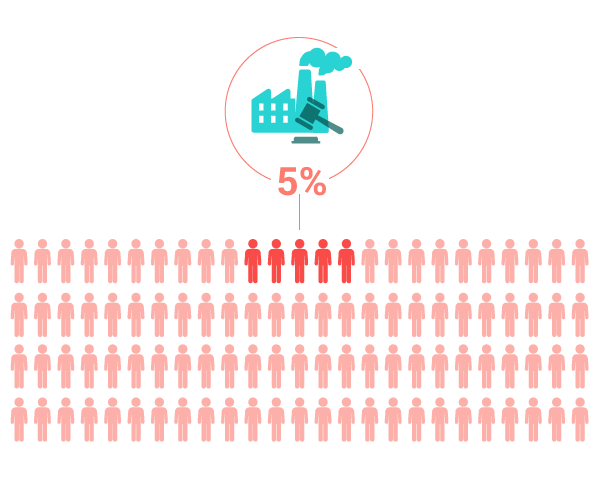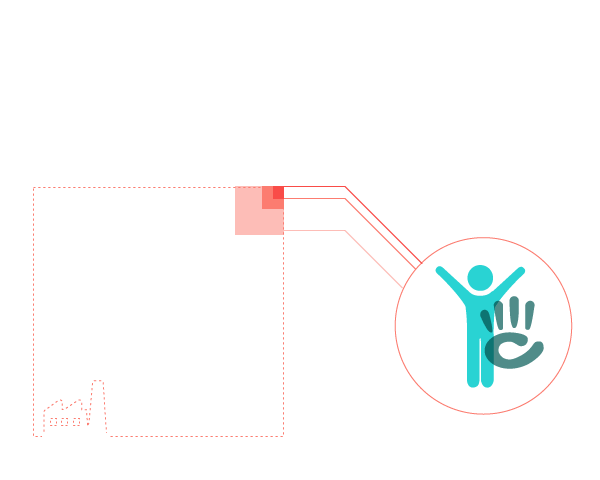Brands are constantly telling consumers that they care.
Most consumers don't believe them.
When brands claim to care about people and their everyday challenges, or about the shared problems we all face – sustainability, social responsibility, and more – most consumers think they’re just saying that.
Sure, that’s a simple characterization of a complex issue, and it doesn’t apply to all consumers and every brand.
But countless surveys, reports and statistics (the below being just one example) all point in the same direction: when it comes to truly caring about consumers, owning a higher purpose and generally being a more HUMAN BRAND, most people think that most brands still don’t get it.

Just 5% of consumers in the UK and US believe big businesses are very transparent and honest.
Cohn & Wolfe, October 2013
Now consumers will challenge brands to put their money where their mouth is.
After all, if brands really do care, then there's a simple way to prove it ;)
Amid their deep skepticism, consumers still yearn for HUMAN BRANDS.
Now, they’re embracing the few brands that are already trying a bold new approach in the quest to become more HUMAN. One that’s visible, straightforward, and directed at a truly meaningful target: pricing.
WHY NOW?
1. MESSAGE SATURATION
2. NEW WORLD, NEW EXPECTATIONS
FEATURED INNOVATIONS
1. PAINKILLER PRICING
2. COMPASSIONATE PRICING
3. PURPOSEFUL PRICING
1. Message Saturation
Consumers have tuned out the white noise issued by a multitude of brands on how much they care about people, society and the planet.
Deep skepticism among many consumers still exists after years of brand campaigns, initiatives, and programs intended to demonstrate that the brands in question really care.
Often these ‘long-term goals’ and vague promises become white noise: consumers have learned to tune them out, or simply take them as a given.
Now, consumers are keen to see brand care and purpose expressed where it really counts.
So if brands really are lifestyle assistants, or if they really do care about the Big Problems we face as global citizens, shouldn’t their (flexible) pricing reflect this?

According to EUR and US consumers, only 5% and 9% respectively of brands make a meaningful difference in people’s lives. Poll global consumers and that figure rises – to 20%.
Havas, June 2013
2. New World, New Expectations
The online world has primed consumers to EXPECT flexible pricing. And a host of agile startups are both willing and able to deliver.
Online, pricing is different. Ultra-flexible, dynamic, personalized and transparent. Now, the online space has primed consumers to bring those expectations with them everywhere.
Meanwhile, a new generation of startup CLEAN SLATE BRANDS – lacking the legacy infrastructure of their established competitors – are more able to roll out flexible pricing in an (near) instant.
It’s a short walk from consumer expectation of more flexible pricing, to consumer embrace of SYMPATHETIC PRICING.
Now check out the Featured Innovations that follow, divided into three categories of SYMPATHY.
1. PAINKILLER PRICING
Discounts that target lifestyle pain points.
Uber
Taxi app gives discounts to travelers hit by transport disruption in London and Boston
In April 2014 during a 48-hour London tube strike, mobile cab app Uber offered 50% off all London trips for passengers who split their fare with another passenger. Meanwhile, in October 2013 the company offered free rides to students in Boston during a 24-hour bus strike.
Brahma #Movimento11
Discounts help Brazilian football fans watch the start of the World Cup
In May 2014, Brazil-based beer brand Brahma launched a campaign intended to address the inconvenient clash of two events due on the 12th June 2014: Valentine’s Day (known locally as Dia dos Namorados) and the first day of the FIFA World Cup. Brahma is encouraging Brazilians to celebrate Valentine’s Day one day earlier than usual. As part of the campaign, dubbed #Movimento11, participating local businesses are offering discounts for those who celebrate on the 11th June.
Noosa International Resort
Hotel room discount if it rains on Australia's 'Sunshine Coast'
In March 2013, Australia’s Noosa International Resort offered guests a ‘Rainy Weather Rebate’; a 20% discount on their hotel accommodation should local rainfall register over 5mm during their stay. Located in Queensland – known as the ‘Sunshine Coast’ – the resort devised the scheme to attract tourists after unseasonably poor weather that included four cyclones, heavy rains and flooding.
The Wolf & I
Free drinks for patrons with parking tickets in Melbourne
Every Thursday, on Local’s Night, Melbourne-based restaurant The Wolf & I will give a free drink to anyone who received a local parking fine on the day.
BGH
Discounts on air conditioning for hot apartments in Argentina
In December 2013, home electronics brand BGH launched the ‘My Home is an Oven’ summer campaign in Argentina, offering discounts on air conditioning systems to people with hot apartments. Consumers could use a website to track their apartment’s exposure to the sun, with the sunniest apartments scoring the biggest discounts. The campaign ran until March 2014, and agency Saatchi & Saatchi say it led to USD 14 million in sales.
Otasuke
Japanese pub offers discounts to balding customers
Opened in Japan during April 2014, Otasuke (“Helping Hands”) is a pub offering discounts to balding customers. A sign posted outside the establishment explains its support for “hard-working fathers losing their hair” due to job stress. Each bald customer gets JPY 500 (around USD 5) off their bill, with a secret perk saved for balding groups of six.
2. COMPASSIONATE PRICING
Discounts that offer a helping hand at a difficult time.
Community Shop
Discounted products for less affluent British consumers
Opened in December 2013, Community Shop is a British supermarket that sells discounted branded products to families receiving government welfare. The project is supported by high street chains and brands such as Marks & Spencer, Tesco, Asda and Tetley, who provide stock for the store from surplus products that don’t meet their standards. Typically this stock would end up in landfill or be turned into animal food.
Pressfolios
Service goes free for laid off New Jersey journalists
In April 2014, online platform Pressfolios announced it would make its service available for free to journalists affected by a staff lay-off by New Jersey’s largest newspaper, the Star-Ledger. Pressfolios allows users to create an online portfolio. The out-of-work journalists received a Pressfolios Pro account with unlimited storage for three months, at no cost.
Lowe's Canada
Free trees for consumers hit by destructive storm
In response to a winter storm that destroyed much of Toronto’s tree canopy, home improvement chain Lowe’s Canada gave away 1,000 red maple trees in the city one Saturday in April 2014. The trees, valued at CAD 30 each, were available for free from the parking lots of two of the store’s Toronto locations, and were given away on a first come, first served basis while stocks lasted.
Tienda Amiga
Shops in Madrid give discounts to the unemployed
Launched in Spain in September 2013, Tienda Amiga (Friendly Shop) is an initiative in which small businesses offer discounts to unemployed customers in their neighborhood. Created by the Asamblea Popular de Hortaleza, a community group in Madrid, the project aims to create a more ethical local economy. By January 2014 more than 150 local shops had signed up, offering discounts of between 5% and 20% to those without work.
Groupon
Discounted onions in response to high onion prices in India
In India during September 2013, Groupon unveiled a promotion in response to rising onion prices in the country. Via the daily deals website, shoppers could purchase 1 kilogram of onions for INR 9 (USD 0.15) – approximately one-eighth of the prevailing cost, including home delivery.
3. PURPOSEFUL PRICING
Discounts in support of a shared value or belief.
Corendon
Dutch airline offers cheaper flights to Russia for gay rights activists
In January 2014, Dutch airline Corendon unveiled a promotion coinciding with the Winter Olympics in Sochi. Any passengers traveling to Sochi to demonstrate for gay rights during the Games could obtain a 50% discount on airfares. The fares were available over a one month period, priced from EUR 399 -799.
RATP
Free public transport in Paris to combat poor air quality
As an incentive for motorists to leave their cars at home, all Parisian public transport was free for one weekend in March 2014. The decision was made by transport chiefs in response to the dangerously high levels of pollution which had engulfed the French capital for days.
Easy Taxi
Discounts for solo Filipino women highlight physical assaults
In February 2014, Brazil-based mobile app Easy Taxi launched a month-long promotion in the Philippines, which waived the PHP 70 booking fee for every solo female passenger in Metro Manila. The move was designed to help encourage women to keep using taxis, after a spate of physical assaults by taxi drivers on their female passengers.
AnchorFree
App to route around internet blocks goes free in Venezuela
February 2014 saw AnchorFree make Hotspot Shield – its online privacy app – free to download in Venezuela. The US-based software brand’s app allows users to bypass government internet blocks. The move came in response to increasing government censorship of the internet in the South American country, spurred by rising civil unrest.








